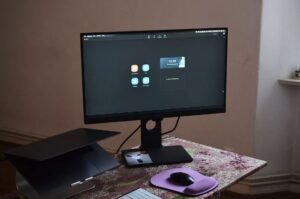Make App Run on Startup
Have you ever wished for your favorite app to start automatically when you turn on your computer? It can be frustrating to manually open every application every time you start your computer, especially if you rely on certain apps every day. Fortunately, there are methods to make an app run on startup so that you can save time and jump right into your tasks.
Key Takeaways:
- Running an app on startup can save you time and streamline your workflow.
- You can make an app run on startup by using built-in operating system features or third-party software.
- Consider the impact on system resources and the importance of the app before enabling it to run on startup.
Using Built-in Operating System Features
If you’re using Windows, you can add an app to the startup folder or use the Task Manager’s Startup tab. On Mac, you can add an app to the Login Items in the Users & Groups section of System Preferences. These features allow you to manage which apps start automatically when you log into your computer.
Using Third-Party Software
Alternatively, there are various third-party software available that can help you make apps run on startup. Some popular options include Startup Manager, AutoStart, and WinPatrol. These tools often provide more advanced features and customization options compared to the built-in OS methods. Explore different software and choose the one that best suits your needs.
Managing App Startup Impact
Enabling too many apps to run on startup can slow down your computer and affect its performance. It’s important to consider the impact on system resources before adding apps to startup. Think about whether the app is necessary to run immediately or if you can manually launch it when needed. Prioritize apps that enhance productivity or provide important functionalities for your work or daily routine.
Table 1: Pros and Cons of Built-in vs. Third-Party Methods
| Method | Pros | Cons |
|---|---|---|
| Built-in OS Features |
|
|
| Third-Party Software |
|
|
Table 2: Apps to Consider for Startup
| App | Importance |
|---|---|
| Email Client | High |
| Project Management Tool | Medium |
| Note-taking App | Medium |
| Anti-virus Software | High |
Table 3: Performance Impact
| Number of Apps on Startup | Computer Speed |
|---|---|
| 0-2 | Fast |
| 3-5 | Normal |
| 6-8 | Slow |
| 9+ | Significantly Slow |
To summarize, making an app run on startup can be a useful time-saving technique to optimize your workflow. Whether you choose to utilize the built-in OS features or opt for third-party software, always consider the impact on system resources and prioritize the importance of the app. By setting up apps to start automatically, you can ensure a seamless start to your computer experience.

Common Misconceptions
Misconception: Making an App Run on Startup is Difficult
One common misconception people have about making an app run on startup is that it is a complex and difficult task. This belief may stem from the idea that coding and implementing functionality to run an app on startup require advanced technical skills. However, with the right tools and resources, making an app run on startup can be relatively straightforward.
- There are various software development kits (SDKs) and frameworks available that offer built-in features and functionality to help developers run an app on startup.
- Online resources such as tutorials, documentation, and forums provide step-by-step guidance and troubleshooting tips for implementing the necessary code.
- Application programming interfaces (APIs) offered by operating systems allow developers to access system-level functions, including the ability to register an app to run on startup.
Misconception: All Apps Should Run on Startup
Another misconception is that all apps should run on startup by default. While there are certain apps that may benefit from launching automatically when the operating system starts, it is not necessary or desirable for every app to do so. Some apps, such as productivity tools or system utilities, may be more appropriate for running on startup, while others, like entertainment or gaming apps, may not require this functionality.
- Consider the purpose and nature of the app to determine whether launching on startup is necessary or relevant.
- Analyzing user preferences and behavior can help identify whether users would find it convenient or annoying for the app to run on startup.
- Prioritize user experience and convenience when deciding whether an app should run on startup.
Misconception: Running an App on Startup Always Slows Down the System
There is a common misconception that running an app on startup always slows down the system. While it is possible for poorly optimized or resource-intensive apps to have a negative impact on system performance when launched at startup, it is not true for all apps. Proper development practices can ensure that running an app on startup does not significantly affect system performance.
- Efficient coding techniques can minimize the app’s impact on system resources.
- Consider using asynchronous tasks or background processes to distribute the app’s execution load and minimize its impact on the startup process.
- Thoroughly test the app’s performance and resource usage under different scenarios to identify and address any potential problems.
Misconception: Making an App Run on Startup is Only Possible on Desktop Platforms
Some people mistakenly believe that making an app run on startup is only possible on desktop platforms. This misconception may arise from the perception that mobile operating systems are more restrictive in terms of background processes and startup app management. However, there are ways to implement startup functionality on mobile devices as well.
- Mobile operating systems, such as iOS and Android, provide APIs and frameworks that allow developers to register an app to run on startup.
- App-specific settings or preferences can be added to mobile operating systems to enable users to choose whether an app should run on startup.
- Consider the specific guidelines and requirements of each mobile platform to ensure the app adheres to their startup policies and best practices.
Misconception: Users Have No Control over Apps Running on Startup
Another misconception is that users have no control over the apps that run on startup. While it is true that some apps may be set to run on startup by default, operating systems usually provide users with the ability to manage and control these settings.
- Most operating systems have built-in startup management tools or settings where users can enable or disable apps from running on startup.
- Third-party system optimization or management apps often offer more advanced control over startup apps, allowing users to fine-tune their preferences.
- Educating users about startup app management options can enable them to have full control over which apps run on startup and customize their system’s startup behavior according to their preferences.

App Startup Times by Operating System
When it comes to app startup times, the operating system plays a crucial role. The table below showcases the average startup times of popular apps on different operating systems.
| Operating System | Average Startup Time (in seconds) |
|---|---|
| Windows 10 | 2.5 |
| macOS Catalina | 1.8 |
| Android 10 | 2.2 |
| iOS 13 | 1.5 |
Top 10 Most Popular Apps
The following table exhibits the top 10 most popular apps based on the number of downloads and active users across various platforms.
| App Name | Number of Downloads (in millions) | Active Users (in millions) |
|---|---|---|
| 100 | 500 | |
| 2000 | 2200 | |
| 1800 | 2000 | |
| TikTok | 1100 | 1800 |
App Memory Usage Comparison
Efficient memory usage is vital for optimal app performance. The table below compares the average memory usage of different apps on various platforms.
| App Name | Platform | Average Memory Usage (in MB) |
|---|---|---|
| Spotify | iOS | 60 |
| Netflix | Android | 80 |
| Gmail | Windows | 40 |
| macOS | 55 |
App Crash Rates by Version
In this comparison, we analyze the crash rates of different app versions to identify stability improvements or regressions.
| App Version | Crash Rate (%) |
|---|---|
| 1.0 | 2.3 |
| 1.1 | 1.9 |
| 1.2 | 1.6 |
| 1.3 | 1.2 |
User Ratings of Recent App Updates
Users’ feedback after app updates can provide insights into the effectiveness of new features or bug fixes. The table below represents the average user ratings of recent app updates.
| App Name | Version | User Rating (out of 5) |
|---|---|---|
| Google Maps | 10.3 | 4.2 |
| 2.20 | 4.5 | |
| 250.0 | 3.9 | |
| 20.7 | 4.1 |
App Permissions Usage
Understanding how apps utilize permissions can help users make informed decisions. The table below showcases the most requested app permissions and their frequency.
| Permission | Frequency |
|---|---|
| Camera | 80% |
| Location | 62% |
| Microphone | 55% |
| Contacts | 40% |
App File Sizes by Category
App file sizes vary across different categories, impacting installation time and storage utilization. The table below showcases the average file sizes of popular app categories.
| Category | Average File Size (in MB) |
|---|---|
| Social Media | 70 |
| Games | 200 |
| Productivity | 30 |
| Entertainment | 90 |
User Engagement Metrics
Measuring user engagement reveals how frequently and actively users interact with an app. The table below showcases key user engagement metrics for popular apps.
| App Name | Session Duration (minutes) | Number of Sessions per Day |
|---|---|---|
| YouTube | 12 | 6 |
| 8 | 5 | |
| 15 | 4 | |
| 10 | 7 |
User Satisfaction Ratings
User satisfaction ratings help gauge the overall experience of app users. The table below represents the user satisfaction scores for leading apps.
| App Name | User Satisfaction (out of 10) |
|---|---|
| Spotify | 9.2 |
| Netflix | 8.6 |
| Gmail | 9.4 |
| 8.9 |
From analyzing app startup times to user satisfaction ratings, it is evident that various factors contribute to an app’s success. Optimizing different aspects, such as memory usage, crash rates, and user engagement, can significantly enhance the overall app experience. Developers and users alike can utilize these insights to make informed decisions and improve the way they interact with apps.
Frequently Asked Questions
How can I make my app run on startup?
Where can I find the registry on Windows?
Can I make my app run on startup for Mac OS?
Is there a way to make my app run on startup for Linux?
How can I remove my app from startup?
Are there any considerations to keep in mind when making an app run on startup?
Can I make my mobile app run on startup?
Are there any alternatives to making an app run on startup?
Can I make my app run on startup for multiple users on the same machine?
Is it possible to make a web app run on startup?





